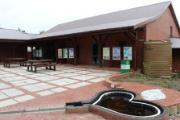
Ms Nosipho Ngcaba, Director-General Department of Environmental Affairs will officially open a custom built Environmental Learning Research Centre at Rhodes University today (13 September).
This newly built building is a unique university-community facility and is perfectly situated between the Eden Grove Lecture Complex and the Makana Botanical Gardens to ensure easy access to members of the public, Rhodes staff and students.
The Centre, constructed through a partnership between the Department of Water and Environmental Affairs, Makana Municipality and Rhodes, boasts a number of custom-built teaching spaces and facilities for public and community education programmes.
One of the key projects of the Centre is a ‘Sustainability Commons’. This is a public knowledge project that is inspired by the challenge to re-orientate environmental education towards practice-centred approaches that bridge the gap between theory and action.
The Commons is a site of practice and community engagement, where groups of people come together to ‘experiment, innovate, monitor and report on key features of sustainability practices and social learning in different social-ecological contexts’.
“One of our most exciting current activities is a project with Makana Youth” says Director of the Goldfields Environmental Education and Sustainability Service Centre, Professor Rob O’Donoghue.
The concept of a Sustainability Commons is in line with the objectives of the United Nations’ recently declared Decade of Education for Sustainable Development and it also fulfils the mandate of the ‘Makana Regional Centre of Expertise in Education for Sustainable Development’.
In 2007 the United Nations University and the Ubuntu Comission recognized Rhodes University and its local environmental education partners as a Regional Centre of Expertise (RCE). This is a significant acknowledgement of the work done in Grahamstown.
The RCEs are tasked with critical analysis of global concepts such as ‘sustainable development’ and through a process of education and learning, making meaning of such concepts in local ways that have a real and sustained positive impact on communities. In order to achieve this, says Prof O’Donoghue, “We need to identify local sustainable practices that are accessible to all”.
Prof Lotz-Sisitka explains that while this sounds like an essentially academic project and that the very nature of environmental education requires an ongoing engagement with social realities.
“It requires ongoing community building as there is a need to engage with all sectors of the education and training system, and all sectors of society. Critical reflexive scholarship, rigorous engagement with social science research methodology and an extensive partnership network are therefore fundamental to the research and teaching programmes of the Chair. They characterize the activities at the new Centre too,” says Prof Lotz-Sisitka.
“Rhodes University is now a recognised centre of excellence in environmental education, both nationally and internationally and has become the most active centre of research in environmental education in Africa,” she adds.
Most recently, the Centre contributed to national research with the Department of Environmental Affairs on environmental sector human capacity and skills development, informing South Africa’s first ever Environmental Sector Skills Plan, showing its contributions not only at local and international levels, but also at national level.
The Centre was funded by the Expanded Public Works Funding through the South African Biodiversity Institute and the Department of Environmental Affairs, as part of the Makana Botanical Gardens renovations project.
The construction of the building created much needed work for over 100 unemployed citizens of Makana
